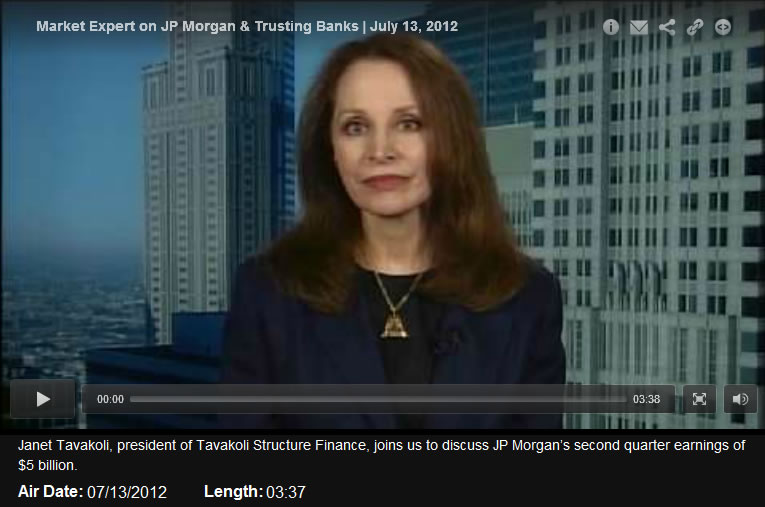JPMorgan's Massive Losses, Failure of Corporate Governance, Questions of Fraud
Companies / Banksters Jul 14, 2012 - 12:45 PM GMTBy: Janet_Tavakoli
 Transcript
Transcript
TOM HUDSON: More now on the JPMorgan (NYSE:JPM) trading loss and the
bank’s response. Janet Tavakoli is president of Tavakoli Structured
Finance with us tonight in Chicago. Janet, I want to get right really to
the heart of JPMorgan’s admission today regarding this $6 billion trading
loss. This is what it said in its release today: the recently discovered
information raises questions about the integrity of the trader marks and
suggests that certain individuals may have been seeking to avoid showing
the full amount of the losses being incurred in the portfolio during the
first quarter. Who is accountable for this?
JANET TAVAKOLI, PRESIDENT, TAVAKOLI STRUCTURED FINANCE: Well, Tom,
first of all, that’s the bombshell. JPMorgan (NYSE:JPM) just said what
they said—is that the whole situation suggests that traders were
knowingly mis-marking their books. Now that’s criminal behavior and that’s
fraud. So it looks as if they’re going in the direction of prosecuting
people. Now they’ve already fired people. They’re clawing back bonuses.
But it looks as if it’s going even further. So the individuals involved,
of course, they are responsible. Now the question is, who in upper
management, including Jamie Dimon, will be held accountable and it seems to
me that Jamie Dimon should be losing his job over this. This unit reported
directly to Jamie Dimon. This was basically a large out of control bank
within a tremendously huge bank. And—
HUDSON: The magnitude exactly. This strategy generated $2 billion in
profits over the previous four years before this year. Deposit money
wasn’t lost, and you know this. Critics, defenders say this trading loss
was just not all that material, considering the bank still is able to
report a profit today.
TAVAKOLI: Well, that’s ridiculous. Now look at what you just
said, that this unit reported 2 billion in profit over several years. Now
they have $5.8 billion in losses year to date. The losses are climbing.
The losses swamp the profits they reported previously, which shows you how
outside this trade was relative to the size of this unit and this unit
itself is a large bank within a tremendously big bank. Now this is one
silo, one unit that blew up at JPMorgan (NYSE:JPM) and JPMorgan (NYSE:JPM)
has trouble elsewhere. The way to look at this isn’t in the context of the
size of JPMorgan (NYSE:JPM), but the size of this unit. Now in terms of
the profits that JPMorgan (NYSE:JPM) reports, it should be reporting
profits. It has a $2.3 trillion balance sheet. The profits it’s reporting
relative to the size of their balance sheet are not big.
HUDSON: Clearly not a fan here, Janet. JPMorgan (NYSE:JPM) has said
it’s going to restate the first quarter result because of this trading loss
and concentrate on that here, admitting a material weakness. That’s a
quote from today release, but it also said it’s taken steps to remediate
the problems. Clearly you are not satisfied that the bank has a handle on
this, let alone the culture that led to this trading loss.
TAVAKOLI: Tom, what has been revealed in the press is embarrassing
detail after embarrassing detail. Taken as a whole, it adds up to an utter
failure of corporate governance. Jamie Dimon has a Sarbanes-Oxley issue
because he signed off on statements saying that his risk management was
adequate and that his corporate governance was adequate, and the unit that
reported to him was very far from it.
HUDSON: We have to leave it there Janet. Highly critical and
certainly will continue. Janet Tavakoli with Tavakoli Structured Finance
in Chicago.
By Janet Tavakoli
web site: www.tavakolistructuredfinance.com
Janet Tavakoli is the president of Tavakoli Structured Finance, a Chicago-based firm that provides consulting to financial institutions and institutional investors. Ms. Tavakoli has more than 20 years of experience in senior investment banking positions, trading, structuring and marketing structured financial products. She is a former adjunct associate professor of derivatives at the University of Chicago's Graduate School of Business. Author of: Credit Derivatives & Synthetic Structures (1998, 2001), Collateralized Debt Obligations & Structured Finance (2003), Structured Finance & Collateralized Debt Obligations (John Wiley & Sons, September 2008). Tavakoli’s book on the causes of the global financial meltdown and how to fix it is: Dear Mr. Buffett: What an Investor Learns 1,269 Miles from Wall Street (Wiley, 2009).
© 2012 Copyright Janet Tavakoli- All Rights Reserved Disclaimer: The above is a matter of opinion provided for general information purposes only and is not intended as investment advice. Information and analysis above are derived from sources and utilising methods believed to be reliable, but we cannot accept responsibility for any losses you may incur as a result of this analysis. Individuals should consult with their personal financial advisors.
© 2005-2022 http://www.MarketOracle.co.uk - The Market Oracle is a FREE Daily Financial Markets Analysis & Forecasting online publication.




